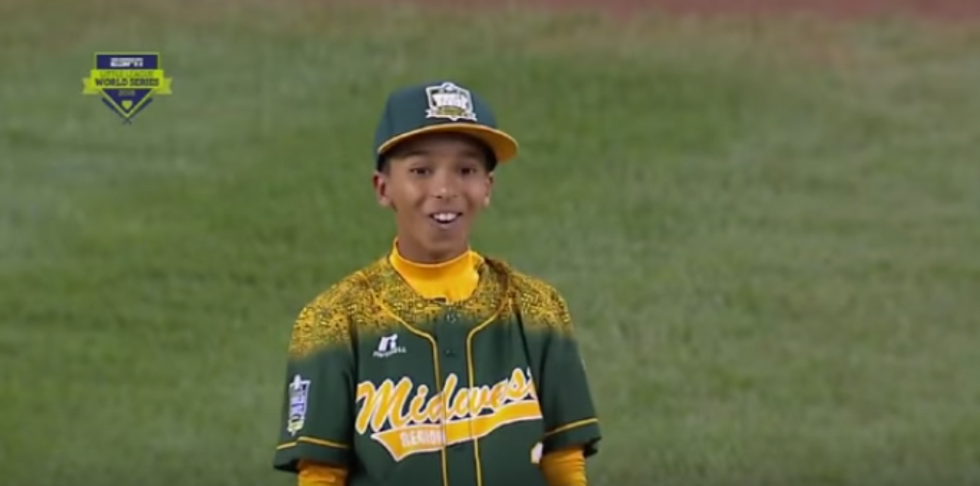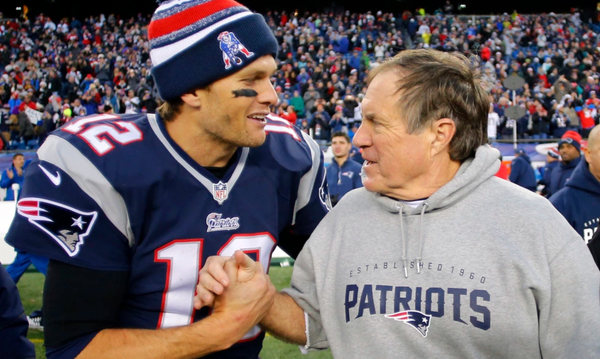What makes your average 12-to-13-year-old smile and giggle like this?
Middle school crush texts you back? Parents finally let you get a puppy? Won the pocket-lotto and found a $20 bill in your jeans?
What if I told you he just gave up one of the longest home runs in Little League World Series history in front of 32,000-plus fans and a national TV audience?
At 5-foot-1 and 85 pounds – presumably soaking wet – Mehki Garrard stood on sports’ loneliest island Friday and watched Cole Wagner deposit his 22nd pitch deep into the South Williamsport night.
Wagner turned around the 75 mph offering – in terms of reaction time, that’s the equivalent of a 98 mph fastball on major league dimensions – during the Mid-Atlantic's 18-0 drubbing of Garrard’s Midwest squad, smacking the smile right onto the opposing pitcher’s face.
This is Williamsport, Pennsylvania. The base paths may be smaller, but the emotions loom larger than life. Halfway to getting knocked out of the Little League World Series, likely the early highlight of these players' young lives, Garrard watched in awe as Wagner launched a Roy Hobbs-esque moon shot that looked destined for a fantastic collision with stadium lights. He entered the at-bat a triple shy of the cycle, including another homer earlier that inning.
Leading up to the pitch, announcer Karl Ravech rattled off Wagner’s night. “Single, double, home run, two RBIs,” he began – Wagner, by the way, rounded the bases on his double after an error in right-center – before the color commentator chimed in, “I think he hits it too hard to hit a triple.”
“[He could] pull one down the line,” Ravech thought out loud during Garrard’s delivery. Upon contact – to dead center field nonetheless, I’d like to think Wagner did it to spite Ravech in the booth suggesting to poke one down the line for the cycle – both announcers yelled in unison; half in disbelief, half in pure excitement, half because, well, it’s their job. Yes, that’s too many halves; you haven’t heard baseball is 90 percent mental, but the other half is physical? We’ve got some leeway here.
Somewhere off in the distance, Kevin Costner whispered a faint “anything travels that far oughta have a damn stewardess on it, don’t you think?”
Catcher Eli Goddard, the man with the front row seat – in the most literal sense of the term – couldn’t hold in his admiration. He didn’t tip off Wagner to the pitch being thrown like Costner’s “Crash” Davis, but let’s face it, it wouldn’t have mattered anyway.
With grace and composure beyond his years, he slowly strode down the third base line, all the while being passed by the 15th, 16th and 17th Pennsylvania runs of the night. Perfectly on cue with the color commentator remarking that he’d like to personally go down and congratulate Wagner, the catcher greeted the 18th and final run of the night with a firm high five like he would an old friend.
Upon further review a middle infielder, likely shortstop Treghan Parker, congratulated Wagner halfway through his well-deserved cruise around the bases. I wouldn’t be surprised if Missouri first baseman Cale McCallister used every ounce of power in his 5-foot-6, 120-pound frame to box out the first base coach to congratulate the slugger first. Not so unfortunately, the camera was focused on a spot in the distance, nearly beyond the reach of the stadium lights. If not for a camera tower planted in the middle of the landing atop Lamade Stadium’s famous hill, the ball may still be going.
As sincere a gesture as a high-five is, there is no gesture as genuine as heartfelt emotion.
There’s an invisible battle that wages in the sixty feet and six inches – forty-six feet in this case – between the batter and pitcher. It is primal in nature. Here’s a club, that guy is going to try to get that ball by you. Don’t let him.
Very few sports are made up of true one-on-one matchups. In basketball there’s help defense, in football over-the-top coverage, and in hockey defenders will put life, limb and teeth in front of a speeding puck no matter the costs. Likely a close second to getting dunked on, having a hitter turn your best fastball into a fan’s souvenir a few hundred feet away is about as bad as it gets in sports.
That embarrassment never seemed to cross Garrard’s mind. Instead he gazed into the distance, open-mouthed, laughing in pure admiration and respect for what he just witnessed. When his third baseman met him on the mound, Garrard laughingly pointed to deep center in the direction of the crater Wagner’s bomb undoubtedly left behind.
Both announcers let out matching high-pitched “woooos,” imitating the young pitcher’s reaction. It left them giddy, as it did millions of fans around the world who regardless of race, beliefs or background all share a common appreciation for baseball and its most spectacular moments – be it performed by a professional athlete or a pre-teen.
Next time you’re watching professional baseball, keep an eye out for every over-the-leg-bat-snap and pray for the unsuspecting water coolers upon which disgruntled pitchers will aggressively take out their anger. For every time that happens there are hundreds of young batters running, not sulking, back to the dugout after striking out and pitchers awe-struck to the point of disbelief after a home run they personally allowed. The Little League World Series, once again, proves a shining example of the unfiltered emotion that fuels sports and competition even in its youngest of competitors.






















